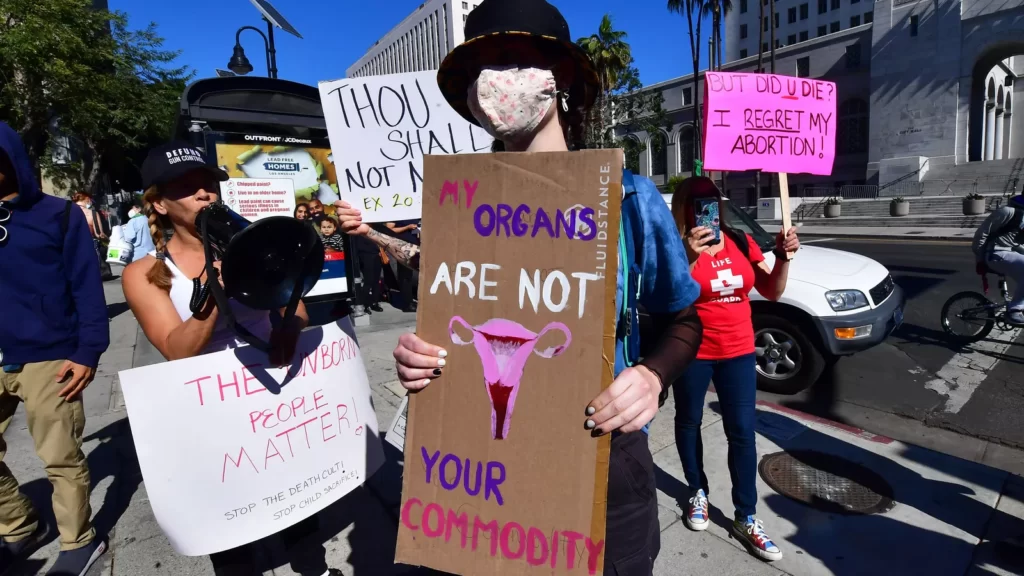Oklahoma Gov. Kevin Stitt (R) on Wednesday signed into law a bill aimed at banning all abortions in the state beginning at fertilization that will be enforced by lawsuits from private citizens.
Why it matters: The near-total ban takes effect immediately upon being signed, making it the most restrictive abortion law in the U.S. It encourages private citizens to sue anyone suspected of helping a person get an abortion.
Details: The measure, H.B. 4327, incentivizes citizens to sue anyone who “performs or induces” or “aids of abets the performance” of an abortion. People can also be sued if they “[intend] to engage” in the previous actions but haven’t yet done so.
- Citizens would be awarded at least $10,000 for successfully suing an abortion provider.
- The bill bars those who are sued from arguing the law is unconstitutional as a defense in court.
- A person cannot be sued if an abortion was provided “at the behest of federal agencies, contractors, or employees that are carrying out duties under federal law.”
Between the lines: Due to the extremely restrictive nature of the ban beginning at fertilization, it could also impact embryos created through the IVF process and some forms of birth control, though the bill specifies it does not apply to contraception.
The big picture: There is already a six-week ban in effect in the state that Stitt signed into law in late April. Both that measure and H.B. 4327 were inspired by a law in Texas that’s currently recognized as one of the most restrictive in the U.S.
Worth noting: Unlike Texas’s ban, Oklahoma does include exceptions for rape and incest if it’s reported to the police. It also allows exceptions if the abortion is needed to save a pregnant person’s life.
Catch up fast: The Oklahoma House initially voted on the bill in late April after the state Senate also advanced it. However, lawmakers added an amendment to the law that required it to be re-considered by both chambers before it was sent to the governor’s desk last Thursday.
- An amendment that was added to the bill stripped state courts’ jurisdiction to consider counter lawsuits against those who sue abortion providers.
The intrigue: In mid-April, Stitt signed a law, S.B. 612, that makes it a felony to provide an abortion, punishable by up to 10 years in prison and a fine of up to $100,000.
- That law is not modeled after Texas’s measure, and is not enforced by citizens’ lawsuits, unlike the most recent measure passed Thursday.
- Oklahoma Attorney General John O’Connor has said that the state’s bans will complement each other. He emphasized that laws enforced by private citizens have “not been overturned by the courts.”
What he’s saying: “I promised Oklahomans that as governor I would sign every piece of pro-life legislation that came across my desk and I am proud to keep that promise today,” Stitt said in a statement.
- “From the moment life begins at conception is when we have a responsibility as human beings to do everything we can to protect that baby’s life and the life of the mother. … If other states want to pass different laws, that is their right, but in Oklahoma we will always stand up for life.”
“The Oklahoma legislature is extraordinarily sloppy” as it has “repeatedly” enacted “overlapping laws in an insane way that makes no sense. There is no aspect of what’s happening with these abortion bans in Oklahoma that is normal,” said Rabia Muqaddam, senior staff attorney for the Center for Reproductive Rights.
- “There is no rhyme or reason [for the state to have passed three abortion bans] other than a radical attack to just confuse people, create chaos and wreak as much havoc as they can possibly do on people who are seeking abortion” she added.
- Muqaddam said that she does not know how H.B. 4327 and S.B. 612 would co-exist because no other state has ever taken similar action.
Zoom out: The U.S. Supreme Court is set to reconsider Roe v. Wade with a decision expected as soon as June.
Don’t forget: Oklahoma is one of the 13 states that has a “trigger law” in place, which is an abortion ban that will kick in right away if the Supreme Court completely overturns its precedents.
- The language of the trigger law has been modified to say that abortion will be prohibited if the court “overrules in whole or in part” Roe v. Wade and Planned Parenthood v. Casey, instead of the precedents being overturned completely.
What we’re watching: The Center for Reproductive Rights has filed a lawsuit to stop the state’s six-week ban — which has not been blocked — and plans to make a request to supplement that case with a challenge to H.B. 4327.
Editor’s note: This story has been updated with comments from White House press secretary Karine Jean-Pierre.

Source: axios.com

